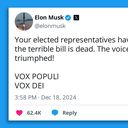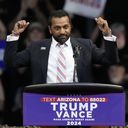Behind the Curtain: Meta's make-up-with-MAGA map
Meta's Mark Zuckerberg has outlined a new template for companies to make up with President-elect Trump and MAGA.
Why it matters: Meta did this with a methodical striptease over nine days, capturing massive public and MAGA attention.
- "This is speaking Trump's love language," a transition source told us.
Zuckerberg had been considering some of the moves for years. Almost all had been in the works for months. But sources tell us Meta deliberately packaged them all up for detonation over nine days to maximize the pop for Trump.
- "It's hard to break through in this media environment," said a source familiar with the strategy. "It sends a signal."
Here's the Meta formula:
- Put a Trump friend on your board (Ultimate Fighting Championship CEO Dana White).
- Promote a prominent Republican as your chief global affairs officer (Joel Kaplan, succeeding liberal-friendly Nick Clegg, president of global affairs).
- Align your philosophy with Trump's on a big-ticket public issue (free speech over fact-checking).
- Announce your philosophical change on Fox News, hoping Trump is watching. In this case, he was. "Meta, Facebook, I think they've come a long way," Trump said at a Mar-a-Lago news conference, adding of Kaplan's appearance on the "Fox and Friends" curvy couch: "The man was very impressive."
- Take a big public stand on a favorite issue for Trump and MAGA (rolling back DEI programs).
- Amplify that stand in an interview with Fox News Digital. (Kaplan again!)
- Go on Joe Rogan's podcast and blast President Biden for censorship.
- And light up social media with all the fireworks.
Between the lines: Love it or hate it, the strategy seemed to work brilliantly. Trump praised Meta. Rogan hailed Zuck.
- House Judiciary Committee Chair Jim Jordan (R-Ohio), who has aggressively investigated Big Tech, said he hopes other companies "follow the lead of X and Meta in upholding freedom of speech online."
Behind the scenes: After visiting Trump at Mar-a-Lago in November, Zuckerberg decided to relax Meta's speech policies and "asked a small team to carry out his goals within weeks," The New York Times reported.
- Knowing the change would be contentious, Zuckerberg "assembled a team of no more than a dozen close advisers and lieutenants, including Joel Kaplan ... Kevin Martin, the head of U.S. policy; and David Ginsberg, the head of communications. Mr. Zuckerberg insisted on no leaks," The Times added.
- Zuckerberg was back at Mar-a-Lago on Friday, a day after taping with Rogan in Austin.
The big picture: Every company in America is watching. We can expect some to copy Zuckerberg — after Elon Musk showed the way.
- Shifts this fast are rare. And rarely isolated.
What we're watching: Backlash — internal and external — is already brewing.
- Training materials for Meta's new speech policies list examples of permissible attacks against various identity groups.
- Roy Austin Jr., who built and led a small civil rights team inside Meta beginning in 2021, announced Friday he was leaving the company.
- Biden criticized Zuckerberg's fact-checking reversal as "shameful" at a new conference Friday.
The bottom line: Alex Bruesewitz — CEO of X Strategies LLC, and trusted adviser to the Trump campaign on alternative media — told us companies are either "a. Finally recognizing that 'wokeness' is a cancer, or b. Strategically adapting to the political climate and pandering to Republicans now that we are in power."
- "Only time will tell which is the true motivation," Bruesewitz said. "Regardless, MAGA is winning and will continue to win!"
Axios' Zachary Basu contributed reporting.













